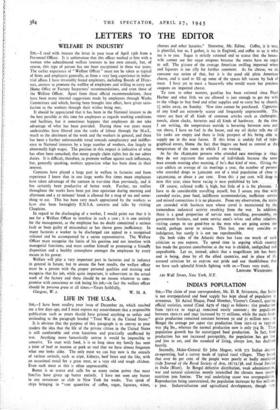WELFARE IN INDUSTRY
LETTERS TO THE EDITOR
Snt,—I read with interest the letter in your issue of April 13th from a Personnel Officer. It is unfortunate that this officer worked at first with a woman who subordinated welfare interests to her own conceit, but, of course, this type of person has not been exceptional in these war years.
The earlier experience of "Welfare Officer" must not be taken as typical of firms and employers generally, as from a very long experience in indus- trial affairs I have invariably found employers, including Boards of Direc- tors, anxious to promote the welfare of employees and willing to tarry out Home Office or Factory Inspectors' recommendations, and even those of
the Welfare Officer. Apart from these official recommendations, there have been many internal suggestions made by employees through Works Committees and which, having been brought into effect, have given satis- faction to the workers through their wishes being met.
It should be appreciated that it has been in the National interest to do the best possible at this time for employees as regards working conditions and facilities, but it sometimes happens that employees do not take -advantage ot what has been provided. During these war years many undesirables have filtered into the ranks of labour through the M.o.L. much to the detriment of the work and the workers in general, and there has been a further unfavourable trend towards complacency and indiffer- ence to National interests by a large number of workers, due largely to abnormally high wages. The position in this respect is indicative of what has often been remarked, that many people claim rights but do not admit duties. It is difficult, therefore, to promote welfare against such influences, but, generally speaking, workers appreciate what has been done in their interest.
Canteens have played a large part in welfare in factories and from experience I know that in one large works five times more employees have taken advantage of the canteen in war-time than previously, and it has certainly been productive of better work. Further, tea trollies throughout the works have been put into operation during morning and afternoon and a to minutes' break is allowed for a mug of tea and some- thing to eat. This has been very much appreciated by the workers as have also been fortnightly E.N.S.A. concerts and talks by visiting Chaplains.
In regard to the discharging of a worker, I would point out that it is not for a Welfare Officer to interfere in such a case ; it is one entirely for the management, as the employee has no doubt committed a serious fault or been guilty of misconduct or has shewn gross inefficiency. In many factories a worker to be discharged can appeal to a recognised tribunal and be accompanied by a union representative. The Welfare Officer must recognise the limits of his position and not interfere with managerial functions, and must confine himself to promoting a friendly disposition and a healthy atmosphere amongst the employees by every means in his power.
Welfare will play a very important part in factories and in industry in general in future, but to ensure the best results, the welfare officer must be a person with the proper personal qualities and training and recognise that his job, while quite important, is subservient to the actual work of the factory and there should be no reason whatever to com- promise with conscience or risk losing his job,—in fact the welfare officer should be persona grata at all times.—Yours faithfully,


























 Previous page
Previous page